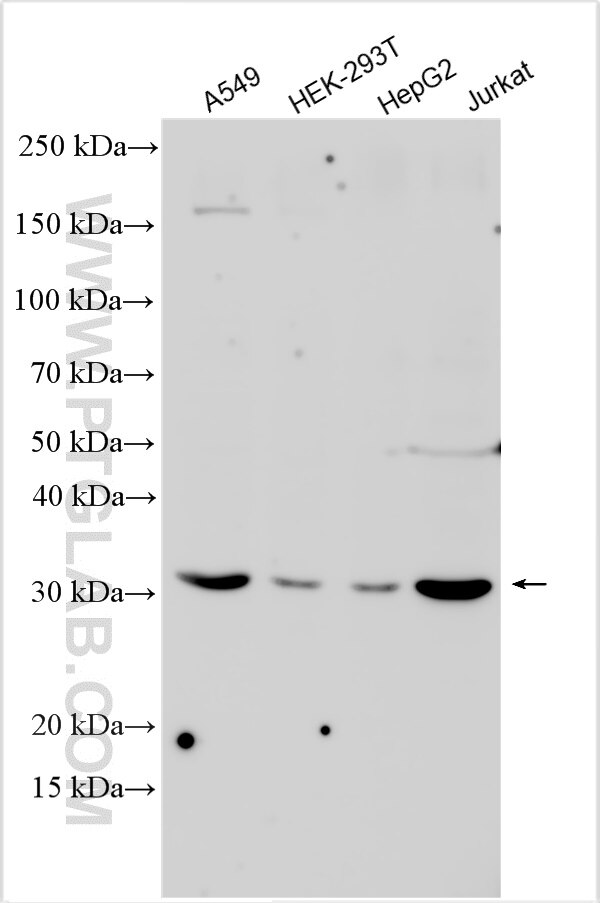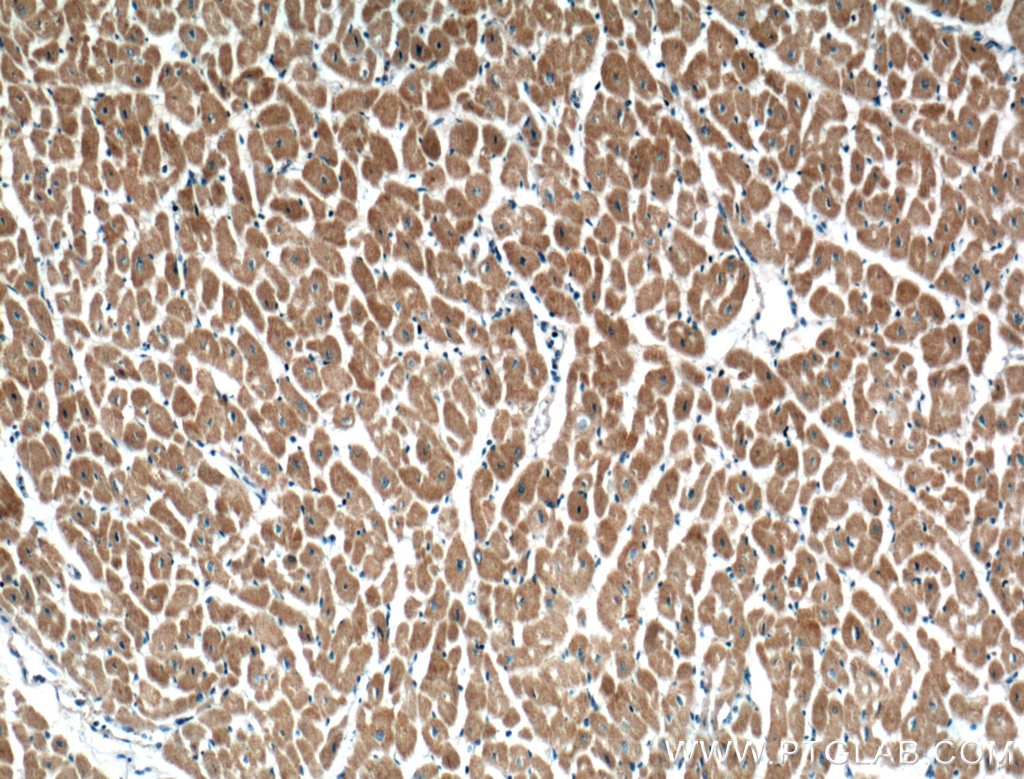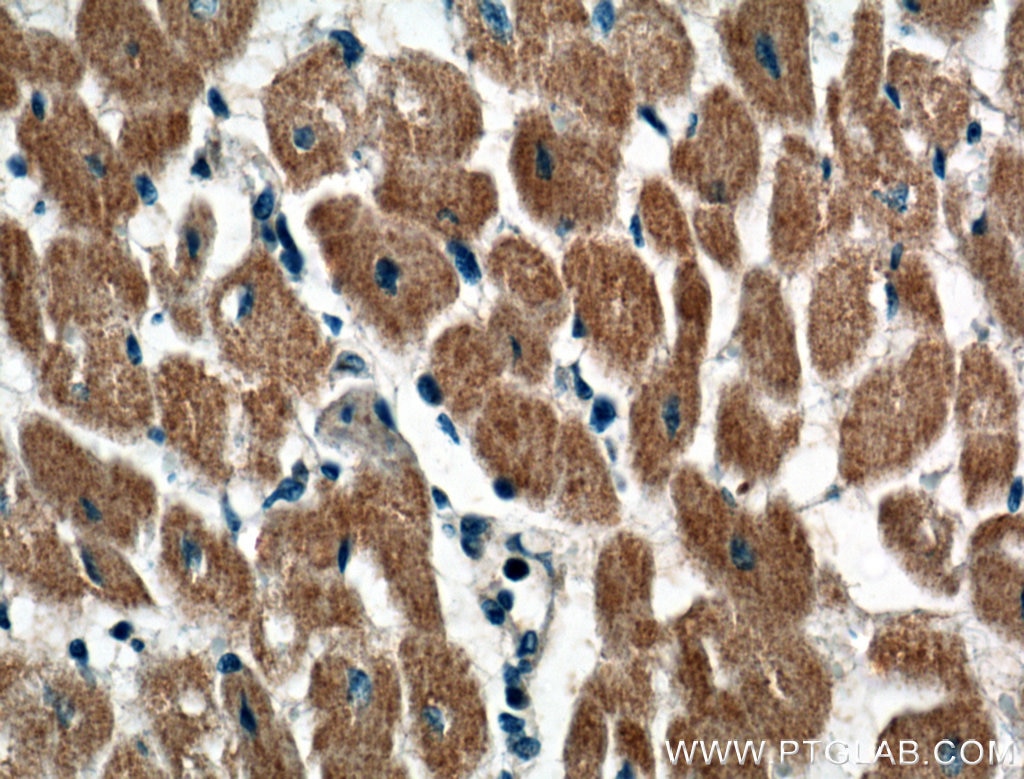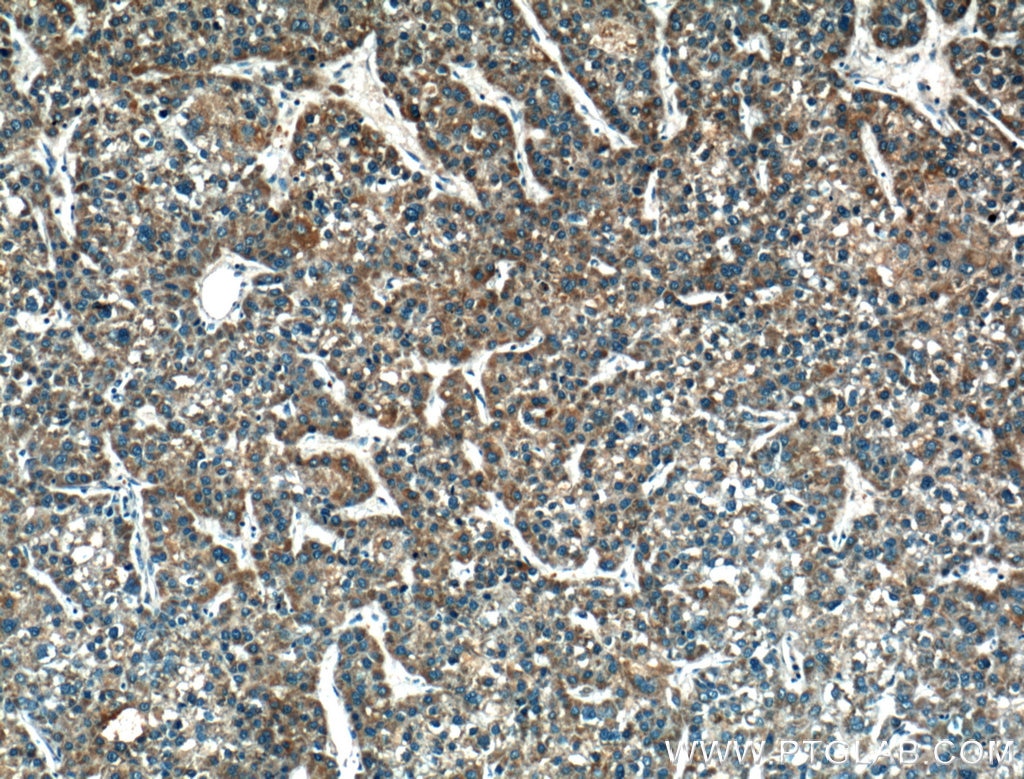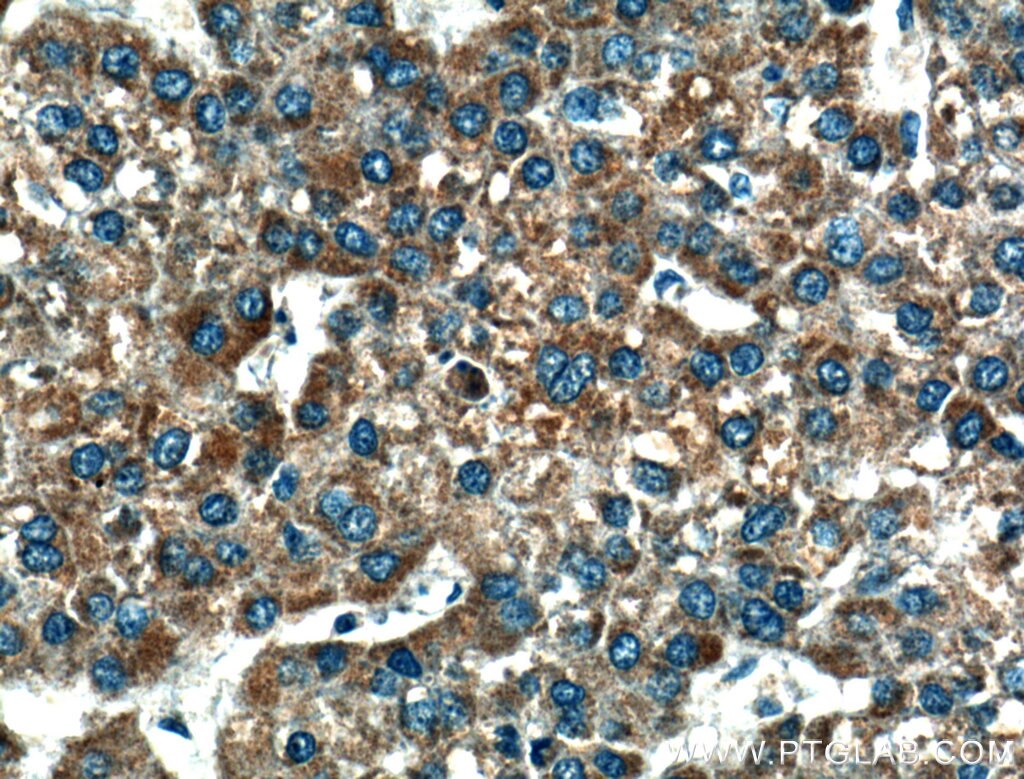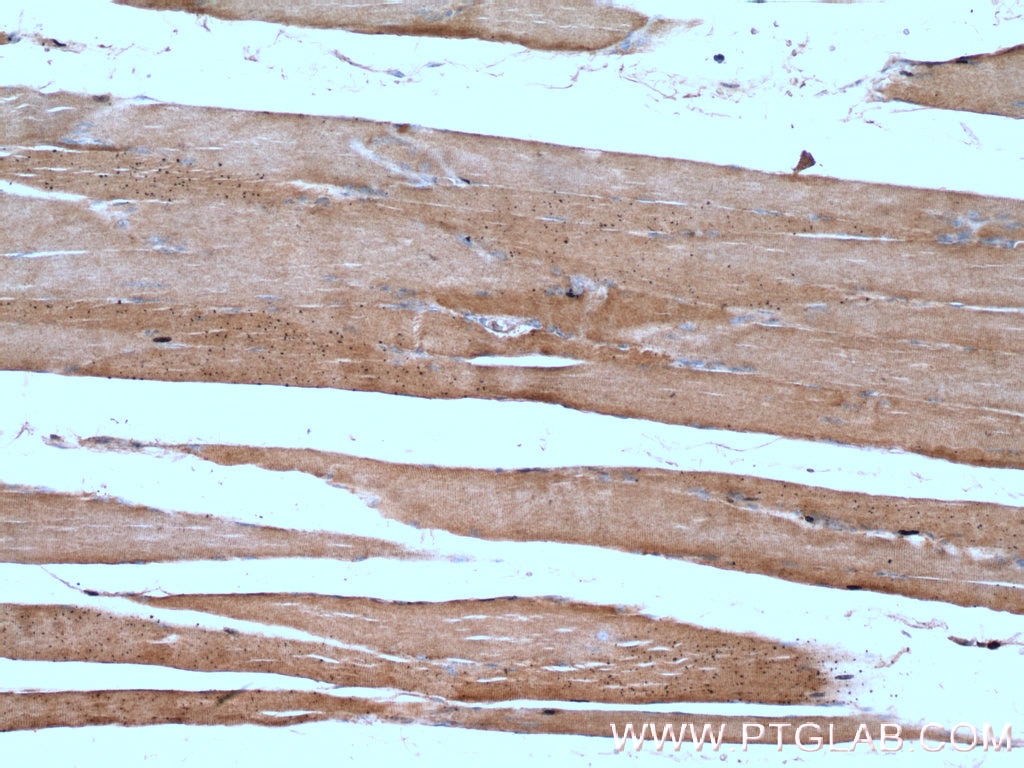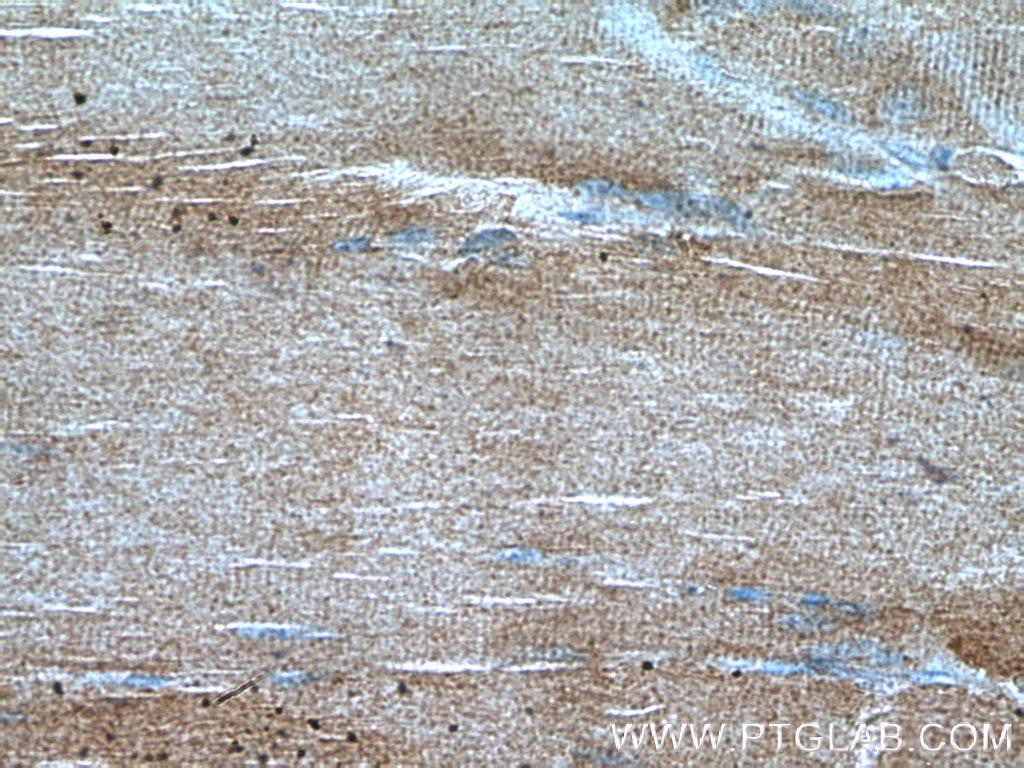- Phare
- Validé par KD/KO
Anticorps Polyclonal de lapin anti-CRLS1-Specific
CRLS1-Specific Polyclonal Antibody for WB, IHC, ELISA
Hôte / Isotype
Lapin / IgG
Réactivité testée
Humain et plus (2)
Applications
WB, IF, IHC, ELISA
Conjugaison
Non conjugué
N° de cat : 14845-1-AP
Synonymes
Galerie de données de validation
Applications testées
| Résultats positifs en WB | cellules A549, cellules HEK-293T, cellules HepG2, cellules Jurkat |
| Résultats positifs en IHC | tissu cardiaque humain, tissu de cancer du foie humain, tissu de muscle squelettique humain il est suggéré de démasquer l'antigène avec un tampon de TE buffer pH 9.0; (*) À défaut, 'le démasquage de l'antigène peut être 'effectué avec un tampon citrate pH 6,0. |
Dilution recommandée
| Application | Dilution |
|---|---|
| Western Blot (WB) | WB : 1:500-1:3000 |
| Immunohistochimie (IHC) | IHC : 1:50-1:500 |
| It is recommended that this reagent should be titrated in each testing system to obtain optimal results. | |
| Sample-dependent, check data in validation data gallery | |
Applications publiées
| KD/KO | See 2 publications below |
| WB | See 11 publications below |
| IF | See 1 publications below |
Informations sur le produit
14845-1-AP cible CRLS1-Specific dans les applications de WB, IF, IHC, ELISA et montre une réactivité avec des échantillons Humain
| Réactivité | Humain |
| Réactivité citée | rat, Humain, souris |
| Hôte / Isotype | Lapin / IgG |
| Clonalité | Polyclonal |
| Type | Anticorps |
| Immunogène | Peptide |
| Nom complet | cardiolipin synthase 1 |
| Masse moléculaire calculée | 33 kDa |
| Poids moléculaire observé | 32 kDa |
| Numéro d’acquisition GenBank | NM_019095 |
| Symbole du gène | CRLS1 |
| Identification du gène (NCBI) | 54675 |
| Conjugaison | Non conjugué |
| Forme | Liquide |
| Méthode de purification | Purification par affinité contre l'antigène |
| Tampon de stockage | PBS with 0.02% sodium azide and 50% glycerol |
| Conditions de stockage | Stocker à -20°C. Stable pendant un an après l'expédition. L'aliquotage n'est pas nécessaire pour le stockage à -20oC Les 20ul contiennent 0,1% de BSA. |
Informations générales
Cardiolipin (CL) is a mitochondrial-specific double negatively charged phospholipid which is intricately involved in regulating bioenergetic efficiency. In eukaryotes, CL is synthesized by cardiolipin synthase (CRLS1 or CLS1) which catalyzes the reversible phosphatidyl group transfer from one phosphatidylglycerol molecule to another to form CL and glycerol. Recently it has been reported that transgenic expression of CRLS1 accelerates cardiolipin remodeling, improves mitochondrial function, modulates mitochondrial signaling, and attenuates mitochondrial dysfunction during diabetes, thereby identifying CRLS1 as a novel therapeutic target to attenuate mitochondrial dysfunction in diabetic myocardium. The predicted molecular weight of CRLS1 is around 32-35 kDa, while a 50 kDa protein with CRLS1 activity had been observed in liver isolation, which may represent an isoform of CRLS1 (20652826).
Protocole
| Product Specific Protocols | |
|---|---|
| WB protocol for CRLS1-Specific antibody 14845-1-AP | Download protocol |
| IHC protocol for CRLS1-Specific antibody 14845-1-AP | Download protocol |
| Standard Protocols | |
|---|---|
| Click here to view our Standard Protocols |
Publications
| Species | Application | Title |
|---|---|---|
EMBO J Cristae formation is a mechanical buckling event controlled by the inner mitochondrial membrane lipidome
| ||
J Nutr Biochem Deficiency of β-carotene oxygenase 2 induces mitochondrial fragmentation and activates the STING-IRF3 pathway in the mouse hypothalamus. | ||
Front Mol Neurosci Cardiolipin externalization mediates prion protein (PrP) peptide 106-126-associated mitophagy and mitochondrial dysfunction | ||
J Biol Chem Myocardial regulation of lipidomic flux by cardiolipin synthase: setting the beat for bioenergetic efficiency. | ||
Neural Regen Res Neuroprotective effects of Alda-1 mitigate spinal cord injury in mice: involvement of Alda-1-induced ALDH2 activation-mediated suppression of reactive aldehyde mechanisms. | ||
Physiol Behav Exercise ameliorates high-fat diet-induced insulin resistance accompanied by changes in protein levels of hepatic ATF3-related signaling in rats. |
Avis
The reviews below have been submitted by verified Proteintech customers who received an incentive for providing their feedback.
FH siiting (Verified Customer) (03-20-2022) | very good , clear band
|
FH siiting (Verified Customer) (03-18-2022) | very good , clear band
|
